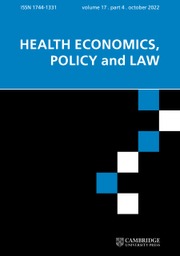Crossref Citations
This article has been cited by the following publications. This list is generated based on data provided by
Crossref.
Martinez-Raga, Jose
Gonzalez-Saiz, Francisco
Oñate, Julian
Oyagüez, Itziar
Sabater, Eliazar
and
Casado, Miguel A
2012.
Budgetary impact analysis of buprenorphine-naloxone combination (Suboxone®) in Spain.
Health Economics Review,
Vol. 2,
Issue. 1,
Zaric, Gregory S.
Zhang, Hui
and
Mahjoub, Reza
2013.
Operations Research and Health Care Policy.
Vol. 190,
Issue. ,
p.
295.
Garrison, Louis P.
Towse, Adrian
Briggs, Andrew
de Pouvourville, Gerard
Grueger, Jens
Mohr, Penny E.
Severens, J.L. (Hans)
Siviero, Paolo
and
Sleeper, Miguel
2013.
Performance-Based Risk-Sharing Arrangements—Good Practices for Design, Implementation, and Evaluation: Report of the ISPOR Good Practices for Performance-Based Risk-Sharing Arrangements Task Force.
Value in Health,
Vol. 16,
Issue. 5,
p.
703.
Mahjoub, Reza
Odegaard, Fredrik
and
Zaric, Gregory S
2014.
Health-based pharmaceutical pay-for-performance risk-sharing agreements.
Journal of the Operational Research Society,
Vol. 65,
Issue. 4,
p.
588.
Levaggi, Rosella
2014.
Pricing schemes for new drugs: A welfare analysis.
Social Science & Medicine,
Vol. 102,
Issue. ,
p.
69.
Pekarsky, Brita A. K.
2015.
The New Drug Reimbursement Game.
p.
127.
Lu, Christine Y
Lupton, Caitlin
Rakowsky, Shana
Babar, Zaheer-Ud-Din
Ross-Degnan, Dennis
and
Wagner, Anita K
2015.
Patient access schemes in Asia-pacific markets: current experience and future potential.
Journal of Pharmaceutical Policy and Practice,
Vol. 8,
Issue. 1,
Zhang, Hui
and
Zaric, Gregory S.
2015.
Using price–volume agreements to manage pharmaceutical leakage and off-label promotion.
The European Journal of Health Economics,
Vol. 16,
Issue. 7,
p.
747.
Kanavos, Panos
Ferrario, Alessandra
Tafuri, Giovanni
and
Siviero, Paolo
2017.
Managing Risk and Uncertainty in Health Technology Introduction: The Role of Managed Entry Agreements.
Global Policy,
Vol. 8,
Issue. S2,
p.
84.
Soini, Erkki
Asseburg, Christian
Taiha, Maarit
Puolakka, Kari
Purcaru, Oana
and
Luosujärvi, Riitta
2017.
Modeled Health Economic Impact of a Hypothetical Certolizumab Pegol Risk-Sharing Scheme for Patients with Moderate-to-Severe Rheumatoid Arthritis in Finland.
Advances in Therapy,
Vol. 34,
Issue. 10,
p.
2316.
Ferrario, Alessandra
Arāja, Diāna
Bochenek, Tomasz
Čatić, Tarik
Dankó, Dávid
Dimitrova, Maria
Fürst, Jurij
Greičiūtė-Kuprijanov, Ieva
Hoxha, Iris
Jakupi, Arianit
Laidmäe, Erki
Löblová, Olga
Mardare, Ileana
Markovic-Pekovic, Vanda
Meshkov, Dmitry
Novakovic, Tanja
Petrova, Guenka
Pomorski, Maciej
Tomek, Dominik
Voncina, Luka
Haycox, Alan
Kanavos, Panos
Vella Bonanno, Patricia
and
Godman, Brian
2017.
The Implementation of Managed Entry Agreements in Central and Eastern Europe: Findings and Implications.
PharmacoEconomics,
Vol. 35,
Issue. 12,
p.
1271.
Ballreich, Jeromie
Alexander, G. Caleb
Socal, Mariana
Karmarkar, Taruja
and
Anderson, Gerard
2017.
Branded prescription drug spending: a framework to evaluate policy options.
Journal of Pharmaceutical Policy and Practice,
Vol. 10,
Issue. 1,
Levaggi, Rosella
2017.
Timely, Cheap, or Risk Free? The Effect of Regulation on the Price and the Availability of New Drugs.
SSRN Electronic Journal ,
Alexander, G. Caleb
Ballreich, Jeromie
Socal, Mariana P.
Karmarkar, Taruja
Trujillo, Antonio
Greene, Jeremy
Sharfstein, Joshua
and
Anderson, Gerard
2017.
Reducing Branded Prescription Drug Prices: A Review of Policy Options.
Pharmacotherapy: The Journal of Human Pharmacology and Drug Therapy,
Vol. 37,
Issue. 11,
p.
1469.
Mahjoub, Reza
Ødegaard, Fredrik
and
Zaric, Gregory S.
2018.
Evaluation of a pharmaceutical risk-sharing agreement when patients are screened for the probability of success.
Health Economics,
Vol. 27,
Issue. 1,
p.
e15.
Antoñanzas, Fernando
Rodríguez-Ibeas, Roberto
and
Juárez-Castelló, Carmelo A.
2018.
Personalized Medicine and Pay for Performance: Should Pharmaceutical Firms be Fully Penalized when Treatment Fails?.
PharmacoEconomics,
Vol. 36,
Issue. 7,
p.
733.
Piatkiewicz, Trevor Jozef
Traulsen, Janine Marie
and
Holm-Larsen, Tove
2018.
Risk-Sharing Agreements in the EU: A Systematic Review of Major Trends.
PharmacoEconomics - Open,
Vol. 2,
Issue. 2,
p.
109.
Antonanzas, Fernando
Juárez-Castelló, Carmelo
Lorente, Reyes
and
Rodríguez-Ibeas, Roberto
2019.
The Use of Risk-Sharing Contracts in Healthcare: Theoretical and Empirical Assessments.
PharmacoEconomics,
Vol. 37,
Issue. 12,
p.
1469.
Critchley, Gregory J.
and
Zaric, Gregory S.
2019.
The impact of pharmaceutical marketing on market access, treatment coverage, pricing, and social welfare.
Health Economics,
Vol. 28,
Issue. 8,
p.
1035.
María Paredes Fernández, Daniela
and
Christian Lenz Alcayaga, Rony
2019.
Managed Entry Agreements: Learnings for Design and Implementation in Light of International Experiences.
Value in Health Regional Issues,
Vol. 20,
Issue. ,
p.
51.


